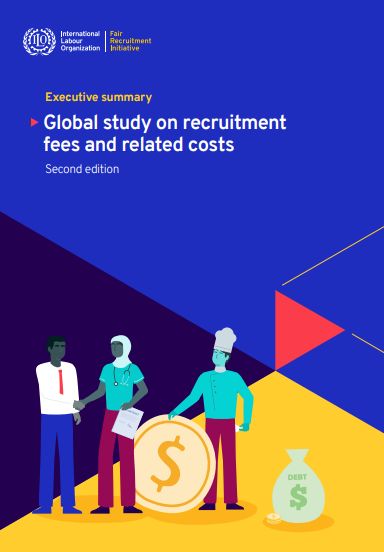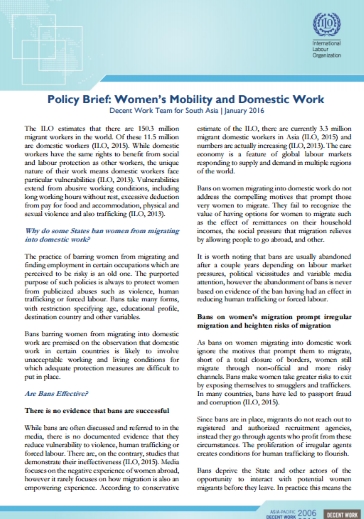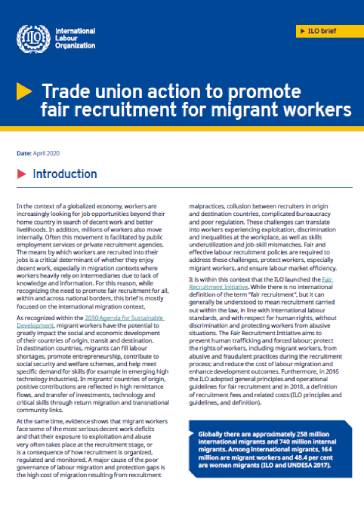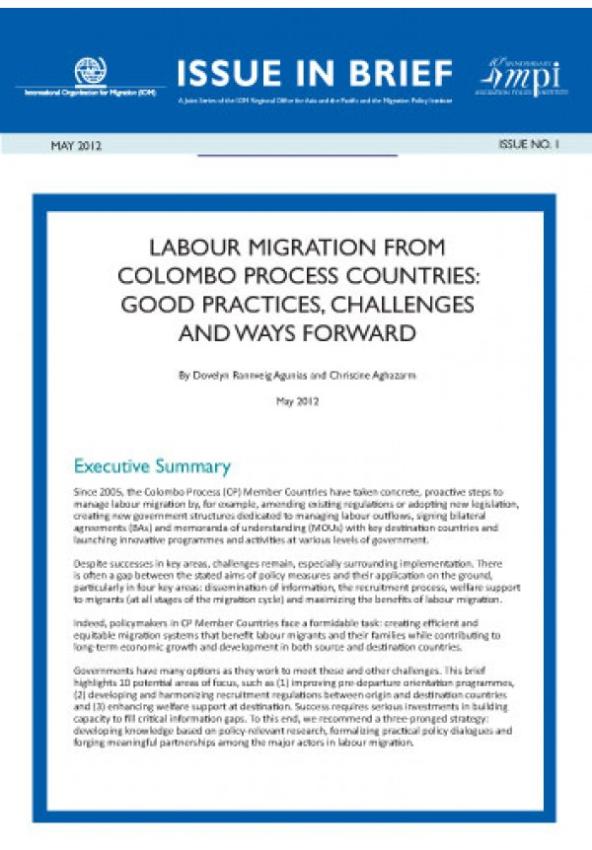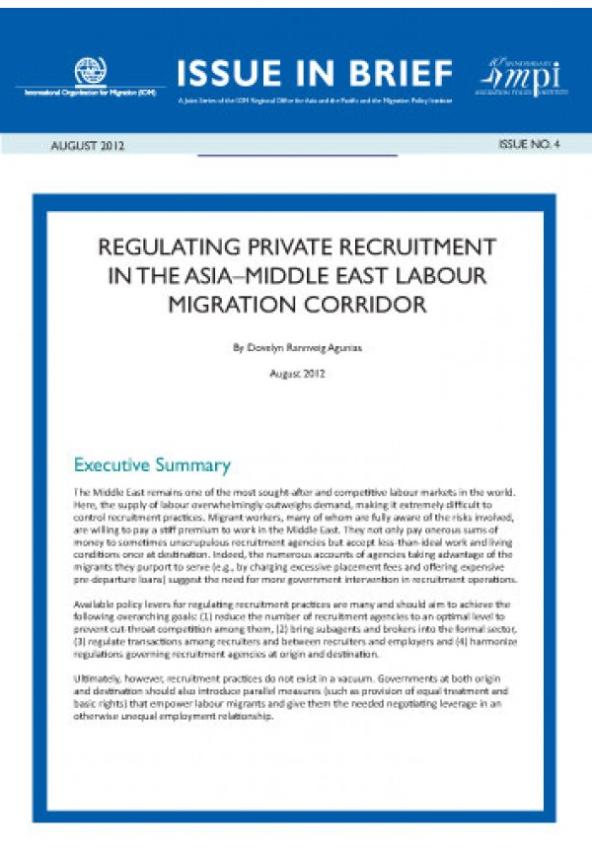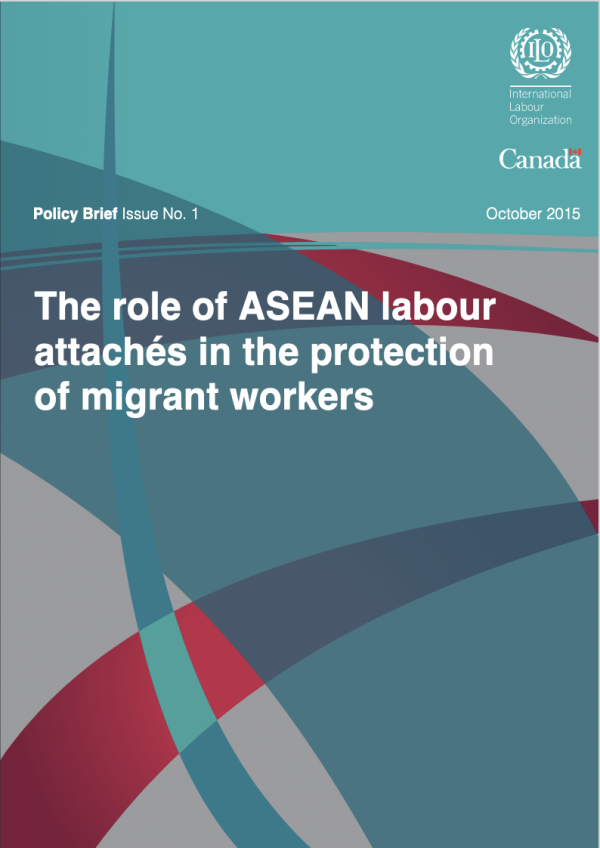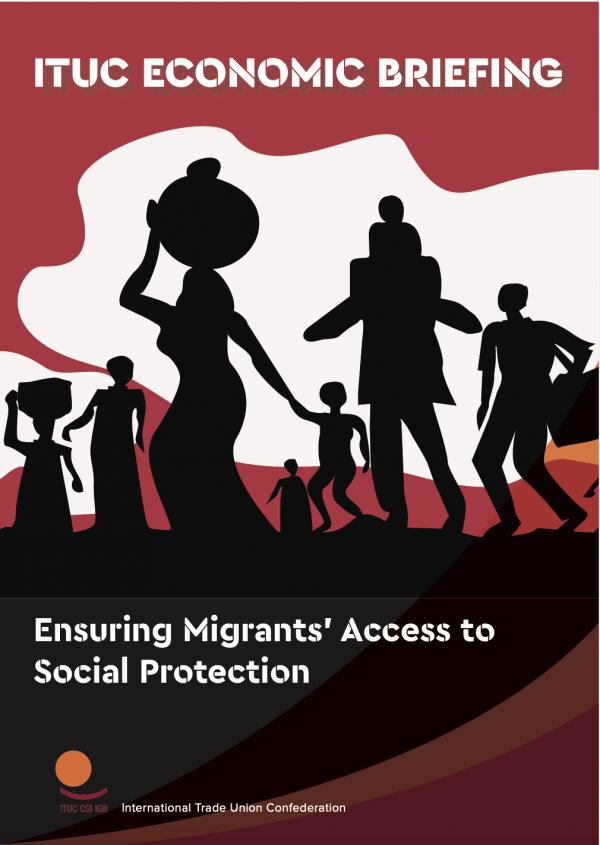Executive Summary - Global study on recruitment fees and related costs: Second edition
This executive summary synthesizes the key finding of the second edition of the Global Study. It presents the trends concerning recruitment fees and related costs for countries, businesses, trade unions, and other recruitment stakeholders, as well as key promising practices and considerations for the future.
The second edition of the Global Study on recruitment fees and related costs is a review of 110 countries across all five regions to document current regulatory approaches and experience on the recruitment fees and related cost. This global study further reviews international, regional, and bilateral frameworks on recruitment and labour migration and considers business-led, trade union, and multi-stakeholder initiatives regarding recruitment fees and related costs. It documents the progress made, challenges encountered, and regulatory gaps that need to be addressed in the five years since the adoption of the ILO Definition of recruitment fees and related costs.
This executive summary synthesizes the key finding of the second edition of the Global Study. It presents in a concise and easily digestible manner the regional trends concerning recruitment fees and related cost, noting important similarities in relation to prohibition or regulation of recruitment fees and costs, and sanctions regimes. It also presents the main findings regarding business-led, trade union and multistakeholder initiatives concerning recruitment fees and related costs, while noting promising practices and considerations for the future.
By examining the global landscape of recruitment practices, the study offers valuable insights into national context-specific regulatory conditions and practical realities that workers, labour recruiters, enterprises, and employers face regarding recruitment fees and costs. It specifically highlights the engagement of the ILO supervisory bodies with the topic of recruitment fees and related costs, showing the multi-faceted and cross-cutting nature of the issue.
Type of document :
Country/Region :
Year of publication :
Theme : ,
Policy Brief: Women’s Mobility and Domestic Work
The ILO estimates that there are 150.3 million migrant workers in the world. Of these 11.5 million are domestic workers (ILO, 2015).
Type of document :
Country/Region :
Year of publication :
Theme : , ,
Trade union action to promote fair recruitment for migrant workers
This brief highlights trade union action to promote and protect fair recruitment for migrant workers through actions including policy advocacy, service provision and outreach.
Type of document :
Country/Region :
Year of publication :
Theme : , ,
IOM-MPI Issue in Brief No. 1 - Labour Migration from Colombo Process Countries: Good practices, challenges and ways forward
International migration has occurred throughout history and regions of the world. Human mobility to, from and within Asia, however, has certain distinctive features, and Asia represents arguably the most dynamic region, with significant intra- and extra-regional migration and some countries being simultaneously origins of and destinations for migrants.
The Migration Policy Institute (MPI) and the International Organization for Migration (IOM) Regional Office for Asia and the Pacific today launched an issue briefs series focusing in particular on labour migration in the region. The eight-part series also will examine diaspora engagement in Asia and climate-induced migration.
The first issue brief, Labour Migration from the Colombo Process Countries, examines labour migration from the 11 Colombo Process countries (Afghanistan, Bangladesh, China, India, Indonesia, Nepal, Pakistan, the Philippines, Sri Lanka, Thailand and Viet Nam). In 2010, an estimated 4.2 million workers migrated from these countries through official channels, many leaving on a temporary basis to work in the Middle East.
The Philippines sent the largest number (nearly 1.5 million), followed by India (641,000) and Indonesia (576,000). Overall, an estimated 44.7 million migrants from the region are living outside their country of origin.
Since 2005, the Colombo Process countries have taken concrete, proactive steps to manage the migration flows and protect their citizens working abroad, strengthening their legislative and administrative frameworks addressing recruitment regulation and welfare protection, as well as signing new accords with key destination countries. Despite the progress, however, the brief details a number of remaining challenges and highlights 10 possible areas of focus for governments.
“Governments in Colombo Process countries face a formidable task: creating efficient and equitable migration systems that benefit labour migrants and their families while contributing to long-term economic growth and development in countries of origin and destination,” said Andy Bruce, IOM regional director for Asia and the Pacific.
In June, IOM and MPI will publish the second issue brief, this one focusing on migrant health issues in the Asia-Pacific region. Subsequent briefs will be published every month through December, and will be available at IOM Online Bookstore and Migration Policy Institute.
Type of document :
Country/Region : , , , , , , , , , , ,
Year of publication :
Theme : , ,
IOM-MPI Issue in Brief No. 4 - Regulating Private Recruitment in the Asia-Middle East Labour Migration Corridor
The Middle East represents one of the most sought-after and competitive labour markets in the world, with an estimated 10 million contract workers in the Gulf states alone – 70 per cent of whom are Asian.
The vast majority of this temporary labour movement is brokered by recruitment agencies; and with the supply of labour overwhelmingly outweighing demand, oversight of recruitment practices is extremely difficult. Migrant workers are willing to pay a stiff premium to work in the Middle East, even in the face of onerous placement fees and less-than-ideal work and living conditions once at destination.
In Regulating Private Recruitment in the Asia? Middle East Labour Migration Corridor, author Dovelyn Rannveig Agunias examines how sometimes unscrupulous recruitment agencies take advantage of the migrants they purport to serve, by charging excessive placement fees and offering expensive pre-departure loans.
The issue brief, the fourth in a series launched by the Migration Policy Institute (MPI) and the International Organization for Migration’s Regional Office for Asia and the Pacific, discusses the policy options that could be implemented to curb abuses by increasing government intervention in recruitment operations.
Available policy levers for regulating recruitment practices are many and should aim to achieve the following overarching goals: (1) reduce the number of recruitment agencies to an optimal level to prevent cut-throat competition, (2) bring subagents and brokers into the formal sector, (3) regulate transactions among recruiters and between recruiters and employers and (4) harmonize regulations governing recruitment agencies at origin and destination.
The issue brief suggests that governments at both origin and destination should become involved by introducing parallel measures (such as provision of equal treatment and basic rights) that empower labour migrants and give them the needed negotiating leverage in an otherwise unequal employment relationship.
The IOM-MPI issue briefs, a monthly joint-publication offering succinct insights on migration issues affecting the Asia-Pacific region today, are available at IOM Online Bookstore and Migration Policy Institute.
Type of document :
Country/Region : ,
Year of publication :
Theme : , ,
ITUC Policy Brief: a new social contract for migrant workers
Decent Work deficits, xenophobia, racism and discrimination, conflicts, insufficient mitigation and adaptation to Climate Change mean many people have no choice but to accept substandard employment or undignified working conditions.
A New Social Contract is more urgent than ever to create more inclusive societies and economies, where migrants and their families can work and live with dignity. Workers call for a rights-based governance of migration that is designed, implemented and monitored through social dialogue and with international labour standards – such as freedom of association and collective bargaining rights – at the forefront.
Type of document :
Country/Region :
Year of publication :
Theme : , , , , , ,
The role of ASEAN labour attachés in the protection of migrant workers
The appointment of labour attachés or consular officials to major countries of destination is one important measure for migrant sending countries to enhance the protection of their migrant workforce. The labour attaché attends to all employment-related matters while consular officials attend to other issues such as consular services and police cases involving migrant workers.
Type of document :
Country/Region :
Year of publication :
Theme :
ITUC Economic Briefing: Ensuring Migrants’ Access to Social Protection
Social protection is a universal human right, providing people with security against poverty, vulnerability and social exclusion. It is moreover a catalyst for inclusive economic growth.
Despite numerous international commitments to extend social protection, nearly half of the world’s population lack any access to these critical benefits and services, and coverage gaps are especially acute in low and middle-income countries.
Migrants are disproportionately excluded from social protection schemes, and their economic vulnerability is compounded by their underrepresentation in the labor market, concentration in precarious and low-paid work, discriminatory laws and entrenched xenophobia.
Legal exclusions to accessing social protection benefits, insufficient build-up of social security contributions within destination countries, lack of possibilities to preserve or transfer social security contributions within destination countries, practical barriers to accessing benefits, and migrant’s labour market exclusion are some of the main reasons for their lack of access. Increased globalization, conflict, demographic change and climate change – and the resulting migration due to these trends – all raise concerns about how to better address migrants’ vulnerability.
This brief examines the reasons for migrants’ exclusion from social protection systems and reviews some ways for closing these coverage gaps. It moreover outlines existing international frameworks related to migration and social protection, as well as provides some selected good practices at national level. Finally, it sets out unions’ key demands for ensuring universal social protection systems that are inclusive of migrants.
Type of document :
Country/Region :
Year of publication :
Theme : , ,
Subscribe to the Fair Recruitment Initiative Newsletter
Sign up to receive news delivered to your inbox.

